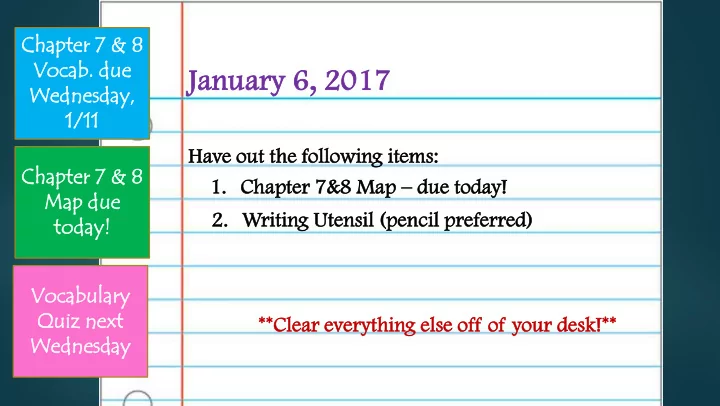

Chapter pter 7 & 8 & 8 Voc ocab. b. due e Jan anuar ary y 6, 2017 Wed ednesd nesday ay, , 1/11 11 Ha Have e out the followin wing g items: s: Chapt pter er 7 & 8 8 1. 1. Chapter ter 7&8 Map – du due toda day! Map due e 2. Writing 2. g Utens nsil il (p (pencil cil prefer erred) ed) tod oday! y! Voc ocabula bulary y Quiz ne next ** **Clear ar everyth ythin ing g else off of your de desk!** !** Wednesda We nesday
Chapter 7: The Ancient Greeks LESSON 1 – RISE OF GREEK CIVILIZATION
Mountains and Seas Greece was the first civilization to develop in Europe. Greek civilization began in an area covered by mountains and seas . The mainland is on the southern part of Europe’s Balkan Peninsula. A peninsula is a body of land with water on three sides. Between these Balkan Peninsula and the Anatolia Peninsula is the Aegean Sea.
Mountains and Seas The Greeks traded goods and ideas between islands and along the area’s coastline . Fishing and trading are how Greeks make a living Some Greeks settled on the farms, growing wheat, barley , olives, and grapes. The inland communities were separated from each other by mountains and valleys. As a result, these communities became independent and considered to be their own countries.
An Island Civilization Greek myths describe an early civilization that developed on Crete , an island southeast of the Greek mainland.
An Island Civilization Built by ancient people, called the Knossos , who constructed the palace for King Minos and his family to live. Their Minoan civilization was the first to develop in the Aegean region and lasted from 2500 B.C. to 1450 B.C. Trade was an important economic activity for the Minoans.
An Island Civilization Sometime around 1450 B.C. the Minoan civilization collapsed. Historians believe either an earthquake destroyed the Minoan cities or people from the Greek mainland, known as the Mycenaean's , invaded Crete.
A Mainland Civilization About 2000 B.C., the Mycenaeans left their homeland in central Asia and moved into mainland Greece.
Heinrich Schliemann German historian Heinrich Schliemann is considered the modern discoverer of the Mycenean world. Schliemann (1822-1890) discovered several palaces and the ancient city of Troy.
Mycenaean’s Kingdom Each Mycenaean king lived in a palace built on a hill, protected by stone walls . Nobles lived outside the walls on large farms called estates . Mycenaean palaces were centers of government .
Traders and Warriors Minoan traders from Crete visited the Greek mainland and the Mycenaeans adopted features of Minoan Culture. They built ships and worked with bronze . They used the sun and states to navigate the seas. Their chief god was Earth Mother.
Traders and Warriors By the mid-1400s B.C., the Mycenaean's had conquered the Minoans and controlled the Aegean Sea. The Mycenaean's were proud of their military successes in the Trojan War.
A Dark Age Over time, the Mycenaean culture declined due to fighting and earthquakes. By 1100 B.C . , the Mycenaean culture had crumbled.
A Dark Age A Greek speaking group known as the Dorians invaded the Greek mainland and took control of most of the region. The next 300 years in Greek history are known as the Dark Age . This was a difficult time in history. Dorian warriors introduced iron weapons and skill of iron making .
The Hellenes By 750 B.C., many descendants of the people who ran away returned to the Greek mainland . Small independent communities developed under local leaders who became kings. These people called themselves Hellenes , or Greeks. Farmers grew more food, traded the surpluses, and developed a writing system that had 24 letters.
Colonies and Trade Greek communities began to send people outside the Aegean area to establish colonies due to a shortage of food. Most of the colonies were along the Mediterranean Sea and the Black Sea . Colonies traded with their "parent" cities causing trade to increase and adding to a colony’s wealth.
The Greek City-State Greek communities became fiercely independent and nobles ruled many city-states. The Greek city-states were made up of a town or city , which formed a polis was like an independent country.
What Did a Polis Look Like? At the center of each polis was a fort built on a hilltop that had a fort called an acropolis . Outside the acropolis was an open area called an agora , which was used as a marketplace. City-states were surrounded by mountains and sea , they were usually small .
What Did Citizenship Mean to the Greeks? We owe many of our ideas about citizenship to the ancient Greeks . In Greece, male citizens had the right to vote , hold public office , own property , and defend themselves in court. Citizens had the responsibility to serve in government and fight for their polis as citizen soldiers. In most city-states, only free, land-owning men born in the polis could be citizens. Women and children might qualify for citizenship, but they had none of the rights.
Citizen Soldiers In Greece, wars were fought by wealthy nobles riding horses and driving chariots . By 700 B.C., citizens called hoplites made up the armies. These soldiers fought on foot . They stood shoulder to shoulder and raised their shields to protect from enemy fire – this formation is known as a phalanx . Citizens put the needs of the polis above their own, but were not unified as a whole country which made Greece easy to conquer.
Recommend
More recommend